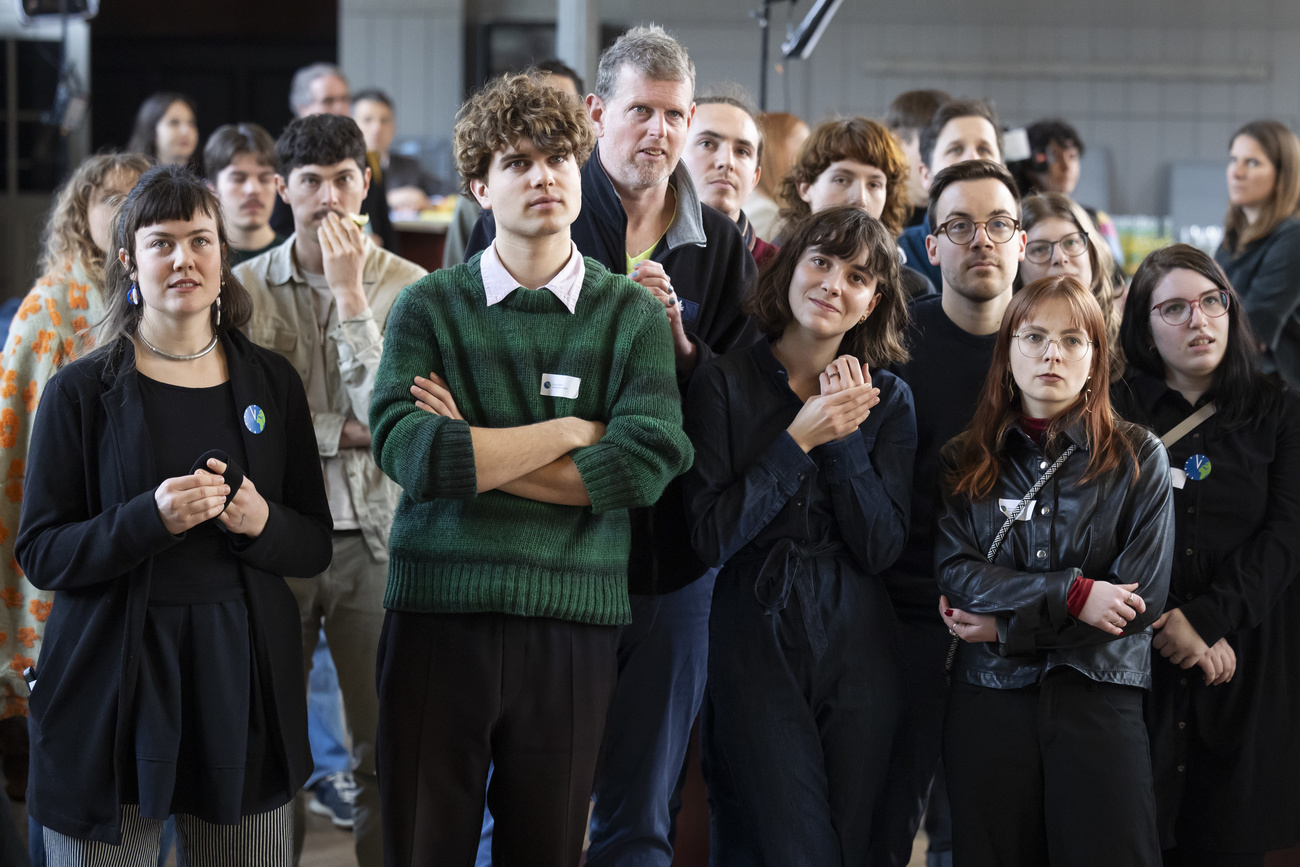
The Week in Switzerland
Dear Swiss Abroad,
Welcome to our selection of some of the biggest – and most colourful – stories in Switzerland over the past seven days.
Who is “Switzerland’s most notorious public intellectual” and why has he been branded a “traitor” by his (many) enemies? We also look at the challenges facing spouses of Swiss Abroad who want to become Swiss, the better-than-expected news about the federal budget deficit, and what Swiss voters made of an initiative for a sustainable economy.
The big stories of the week

The man who exposed Switzerland’s dirty secrets
Swiss sociology professor Jean Ziegler has spent the past 60 years slamming Switzerland for enabling evil around the world, in the process notching up countless enemies, many of whom accuse him of treason.
On Thursday The Guardian newspaper in the UK published a “long readExternal link” devoted to “Switzerland’s most notorious public intellectual”. Ziegler, 90, doesn’t mince his words: “Blood may not run down the walls of the UBS headquarters,” he once said. “But it’s as if it did: the relative wellbeing of Swiss people is financed by death, fear and famine.”
The article, written by a journalist who grew up in Geneva, looks at Ziegler’s formative years – including times spent with Jean-Paul Sartre, Simone de Beauvoir and, later, Che Guevara – and what drove him to implicate Swiss companies (especially banks) and individuals in everything from drug trafficking to human rights abuses abroad.
“The fact that this tiny country of only 42,000 sq km, of which only 60% is habitable, with a population of fewer than ten million, is such a powerful offshore centre – that 27% of the world’s offshore fortunes are managed in or from Switzerland – it’s just astonishing,” he says.

Switzerland (almost) balances the books
Good news, sort of, on Wednesday, when provisional figures showed that the federal budget at the end of 2024 was only CHF80 million ($88 million) in the red instead of the budgeted CHF2.6 billion.
Finance Minister Karin Keller-Sutter said she was “relieved and satisfied” at a press conference in Bern, but she stressed several times that the result was not entirely realistic: it was due to higher revenues, specific one-off factors and the CHF4 billion in savings measures taken over the past two years, Swiss public television, RTS, reported.
Political reaction was mixed, reported Swiss public radio, SRF, with parties focusing on government measures to save billions of francs. The left-wing Greens and the Social Democrats were pleased with Wednesday’s news but also angry. Savings were being made at the expense of social projects and the environment and climate, they said, adding that this now needed to change. Social Democrat parliamentarian Sarah Wyss hoped that the majority of parliament “will realise that we need to invest – and that we can afford to do so”.
However, Lars Guggisberg from the right-wing Swiss People’s Party reckoned the savings package was “more necessary than ever. We’ve lived massively beyond our means over the past 30 years. Expenditure has risen significantly faster than economic growth”.

The citizenship obstacle course facing spouses of Swiss Abroad
One of our most popular articles this week looked at the hurdles facing the husbands and wives of Swiss Abroad who want to become Swiss.
“It’s too complicated,” declared André Henri, a Swiss in Thailand, discussing his wife’s possible naturalisation as a Swiss citizen. “There’s no way of knowing where you are in the application process,” complained Antoine Belaieff, a Swiss national in Canada.
Nevertheless, every year more than a hundred spouses of Swiss citizens living abroad apply for “simplified naturalisation” at their Swiss embassies or consulates. In this article, my colleague Emilie Ridard explains the requirements for simplified naturalisation, the procedure and deadlines, and how much you can expect to pay for the privilege of becoming Swiss.

Swiss voters reject green overhaul of economy
Voters on Sunday overwhelmingly said no to an ambitious proposal by the Young Greens for a rapid transition to a sustainable economy.
The Swiss go to the polls four times a year to decide on various issues at federal, cantonal and municipal level. On Sunday there was only one federal issue, the “environmental responsibility initiative”, which called for the Swiss economy to respect “planetary boundaries”, in other words to not consume more than the Earth can regenerate.
In the end, however, only 30% of voters – and not one of the country’s 26 cantons – backed it. Turnout was around 38%, well below the average of 45%.
In an interview with SWI swissinfo.ch, political analyst Cloé Jans explained why the initiative flopped, pointing to a failure to convince people in rural and conservative areas, the current uncertain economic situation, and the general Swiss dislike of bans – being told what they can’t do.
The Swiss Abroad also rejected it but continued the trend of being greener than the electorate as a whole: 45% backed the initiative. Turnout was also low among the Swiss Abroad: 20% of eligible expatriates voted, compared with an average of 25% in recent referendums.

The youth section of Swiss parties: what’s the point?
An initiative to curb executive salaries by the Young Social Democrats in 2013, the pension initiative of the Young Radical-Liberals last year and now the environmental responsibility initiative of the Young Greens – all three were heavily rejected at the ballot box. But even when it’s shot down by voters, a popular initiative often pays off for the youth section of a party at other levels, political scientist Urs Bieri told Swiss public radio, SRF.
Being young means thinking more in black and white – initiatives are therefore more attractive to young people if they are formulated in a radical and fundamental way, he explained. This may make it easier to mobilise young people and perhaps even win them over as members of their party.
However, when it comes to the actual vote, they usually have to expect disappointment. That said, popular initiatives tend to pay off for young parties in the long term, as visibility is generated, profiles can be increased, and issues can have an impact on political discourse, Bieri said.
“Youth parties are a very important training ground for the entire political process. We know that being politicised at a young age has a longer and more lasting effect. It’s therefore no surprise that experienced people from youth parties can also rise to the highest offices,” he said.
Swiss Oddities

Six hundred years ago a grisly witch hunt in the Simmental was described in a book.
But how did the events in a valley in the Bernese Oberland go on to become the blueprint for witch hunts throughout Europe?
Photo of the week

The week ahead

On Monday a verdict is expected in the strange case of a reggae band from Bern. In 2022 the four white musicians, some of whom have dreadlocks and wear typically African clothes, played a gig at a left-leaning restaurant in Bern. Some of the audience apparently felt uncomfortable with what they saw as “cultural appropriation”, and it was decided during an interval that the band wouldn’t go back out. The youth section of the right-wing Swiss People’s Party saw this as blatant racism – against white people – and reported the restaurant to the authorities. The public prosecutor’s office in Bern then fined the restaurant CHF3,000. The restaurant appealed, hence the court case.
The “generation barometer 2025” will be published on Thursday. What motivates the generations in Switzerland and what burdens them? How is cohesion between the generations perceived? For the fourth time, the Bernese House of Generations has conducted a representative study to take the pulse of the Swiss population.
Edited by Balz Rigendinger/dos

In compliance with the JTI standards
More: SWI swissinfo.ch certified by the Journalism Trust Initiative





